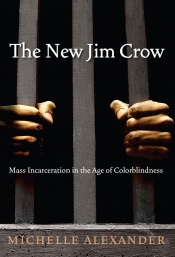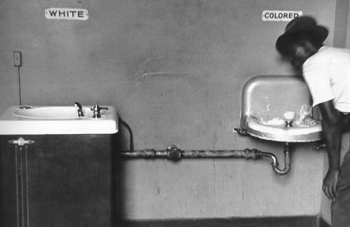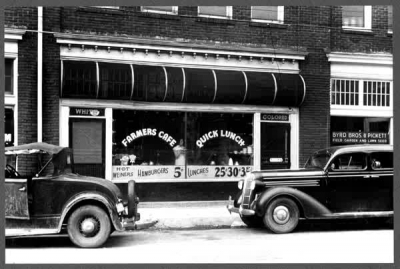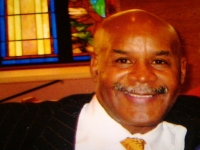 The New Jim Crow: Mass Incarceration in the Age of Colorblindness, By Michelle Alexander (The New Press, New York, N.Y., 2010, 290 pages.)
The New Jim Crow: Mass Incarceration in the Age of Colorblindness, By Michelle Alexander (The New Press, New York, N.Y., 2010, 290 pages.)
Book Review by Dennis Moore
October 8, 2010 (San Diego) -- Michelle Alexander, former director of the Racial Justice Project of the American Civil Liberties Union (ACLU) in Northern California and a former law clerk for Justice Harry Blackmun on the U.S. Supreme Court, has written a provocative and thought-provoking book about race and incarceration, The New Jim Crow: Mass Incarceration in the Age of Colorblindness.
She created a buzz in San Diego on October 1st and 2nd, bringing her book and message to a reception at the Jacobs Center and St. Stephens Cathedral. This scholar, wife and mother challenges the civil rights community, and all of us, to place mass incarceration at the forefront of a new movement for racial justice in America. Shortly thereafter from sitting across and interviewing Ms. Alexander, she would win the NAACP Image Award in Literature.
 Alexander states, “The fact that more than half of the young black men in any large American city are currently under the control of the criminal justice system (or saddled with criminal records) is not – as many argue – just a symptom of poverty or poor choices, but rather evidence of a new racial caste system at work.”
Alexander states, “The fact that more than half of the young black men in any large American city are currently under the control of the criminal justice system (or saddled with criminal records) is not – as many argue – just a symptom of poverty or poor choices, but rather evidence of a new racial caste system at work.”
My own son was one of those young black men. To see my high school “Honor Roll” and star athlete son, who had received a scholarship in architecture to Syracuse University, being brought into court in chains from an Illinois prison, was painful beyond belief, for it conjured up images of us as a people being brought to this continent from Africa in chains. Thankfully, my son was ultimately sentenced to 4 months in a “boot camp,” and not the 30 years in prison that he was facing. A lot of African-American parents would not be that fortunate. Still, the stigma and residue of incarceration hangs over him, despite the fact that he has been gainfully employed and leading a model life since being released from “boot camp” more than five years ago. My son, Damien, proudly wears a tattoo on his arm that says: “Only God Can Judge Him!” One of the first things he did after coming home, my Christmas present, was to go to our Church the Apostolic Church of God in Chicago and get baptized. President Barack Obama actually gave his famous Father's Day speech at this Church, where I and two of my children were baptized, and which is down the street from the Obamas' Chicago home. See speech here.
Alexander states in the introduction of her book: “Knowing as I do the difficulty of seeing what most everyone insists does not exist, I anticipate that this book will be met with skepticism or something worse. For some, the characterization of mass incarceration as a ‘racial caste system’ may seem like a gross exaggeration, if not hyperbole.” She further states that “Jim Crow and slavery were caste systems. So is our current system of incarceration.”
The author offers statistics to support her thesis, stating, “The United States now has the highest rate of incarceration in the world, dwarfing the rates of nearly every developed country, even surpassing those in highly repressive regimes like Russia, China, and Iran. In Germany, 93 people are in prison for every 100,000 adults and children. In the United States, the rate is roughly eight times that, or 750 per 100,000.” Statistics also show that in some states, black men have been admitted to prison on drug charges at rates twenty to fifty times greater than those of white men. ( Human Rights Watch, Punishment and Prejudice: Racial Disparities in the War on Drugs, HRW Reports vol. 12, no. 2 [New York, 2000]). Alexander also states in her book that if there are significant differences in the surveys to be found, they frequently suggest that whites, particularly white youth, are more likely to engage in drug crime than people of color. (See, e.g., Howard N. Snyder and Melissa Sickman, Juvenile Offenders and Victims: 2006 National Report, U.S. Department of Justice, Office of Justice Programs, Office of Juvenile Justice and Delinquency Prevention).
Perhaps, most profound is the introduction to Alexander’s book: “Like Jim Crow (and slavery), mass incarceration operates as a tightly networked system of laws, policies, customs, and institutions that operate collectively to ensure the subordinate status of a group defined largely by race.” She further states, “Since the nation’s founding, African Americans repeatedly have been controlled through institutions such as slavery and Jim Crow, which appear to die, but then are reborn in new form, tailored to the needs and constraints of the time.”
 To more fully comprehend and follow along in Alexander’s book, it would help to understand the history and concept of “Jim Crow.”
To more fully comprehend and follow along in Alexander’s book, it would help to understand the history and concept of “Jim Crow.”
Jim Crow was the name of the racial caste system which operated primarily between 1877 and the mid-1960s. Jim Crow was more than just a series of rigid anti-Black laws. It was a way of life. Under Jim Crow, African Americans were relegated to the status of second class citizens. Jim Crow represented the legitimization of anti-Black racism. As I was born near the end  of the Jim Crow era, I am painfully aware of the signs that would state: “No Dogs, Negros, Mexicans,” and signs stating; “Colored Served In Rear,” as well as the drinking fountains designating separate for whites and colored.
of the Jim Crow era, I am painfully aware of the signs that would state: “No Dogs, Negros, Mexicans,” and signs stating; “Colored Served In Rear,” as well as the drinking fountains designating separate for whites and colored.
As I was born in Charleston, Missouri, shortly before William Shatner of “Star Trek” fame starred in a movie made there by Roger Corwin about race relations titled “Shame” (The Intruder), I am even more painfully aware of the vestiges of Jim Crow, as pointed out in Alexander’s book. In this movie, which can be obtained from Blockbuster and other media outlets, it actually shows friends of mine that I grew up with some 45 years ago, along with the Jim Crow customs. See attached video here.
Alexander eloquently states in her book: “I argue that the shame and stigma of the ‘prison label’ is, in many respects, more damaging to the African American community than the shame and stigma associated with Jim Crow. The criminalization and demonization of black men has turned the black community against itself, unraveling community and family relationships, decimating networks of mutual support, and intensifying the shame and self-hate experienced by the pariah caste.” I can’t argue her point either, for I have seen and lived through both sides of the issue, being born in the Jim Crow era, and ministering to incarcerated inmates in Illinois and California.
It is hard to imagine this “shame and stigma of the ‘prison label’ being more damaging to the African American community than the shame and stigma associated with Jim Crow, as Alexander states, especially when you examine the horrible legacy of slavery and Jim Crow, as graphically depicted in another book, Without Sanctuary, by Hilton Als and James Allen. It depicts the numerous lynching of African American men.
This scholarly examination and critique of race, The New Jim Crow, clearly states in the introduction of the book: “It justifies a legal, social, and economic boundary between ‘us’ and ‘them.’ Chapter 5 also explores some of the differences among slavery, Jim Crow, and mass incarceration, most significantly the fact that mass incarceration is designed to warehouse a population deemed disposable – unnecessary to the functioning of the new global economy – while earlier systems of control were designed to exploit and control black labor.” Try to explain that to the mostly black and brown brothers that I regularly visit and minister to at RJ Donovan Prison in San Diego County, and those that I once ministered to in Illinois jails and prisons!
These incarcerated African American men that Alexander speak of in her book are not nameless and faceless men. They are a Christopher Greene, a young black man with a documented history of mental illness, that I have visited with and correspond with regularly; They are Andre Harrison, who has served timed in RJ Donovan Prison, and is now out trying to maintain a job, that I mentor; they are “Eddie,” still serving time at RJ Donovan Prison, who recently pleaded with me at a worship service at the prison to continue coming out there to visit and participate in the services; they are a Reggie McMillin, who is attempting to escape the unfair and misapplied designation of his being a sexual predator, now that he has been out of prison for a number of years; they are my own three paternal brothers, who were once incarcerated at the same time; they are a “Dwight,” a young black man formerly at RJ Donovan that I had befriended, serving triple-life; What’s up with that, as if a life sentence is not sufficient? I developed a fondness for Dwight after hearing his story.
 Pictured here is the RJ Donovan Prison Ministry Chapel where I would meet and minister to many of the aforementioned inmates, while President of the Bethel A.M.E. Prison Ministry in San Diego. Also, in this Chapel I would participate in the nationally recognized "Kairos" event.
Pictured here is the RJ Donovan Prison Ministry Chapel where I would meet and minister to many of the aforementioned inmates, while President of the Bethel A.M.E. Prison Ministry in San Diego. Also, in this Chapel I would participate in the nationally recognized "Kairos" event.
They are a Mustafa Abdullah, a longtime and childhood friend of mine, that recently got released from prison due to changes to sentencing guidelines (crack cocaine), as Alexander refers to in her book; They are a Rev. Dennis Malone, now the director of the San Diego chapter of “All of Us or None,” a support organization of formerly incarcerated men, that Alexander also refers to in her book. In anticipation of my interviewing the author of The New Jim Crow, Rev. Malone indicated to me: “Exposing those exploiting the incarcerated for private economical gains within our community is more harmful than outside exploitation.”
Surprisingly to me, the author states that “Clinton – more than any other president – created the current undercaste.” In her book, Alexander states: “To the contrary, in 1992, presidential candidate Bill Clinton vowed he would never permit any Republican to be perceived as tougher on crime than he. True to his word, just weeks before the critical New Hampshire primary, Clinton chose to fly home to Arkansas to oversee the execution of Ricky Ray Rector, a mentally impaired black man who had so little conception of what was about to happen to him that he asked for the dessert from his last meal to be saved for him until the morning. After the execution, Clinton remarked, ‘I can be nicked a lot, but no one can say I’m soft on crime.’”
In further regard to the incarceration and subsequent execution of this mentally ill black man in Arkansas, in a one-on-one interview with the author of The New Jim Crow on October 1, 2010, in the offices of the United African American Ministerial Action Council (UAAMAC) in San Diego, I asked Ms. Alexander her viewpoint on the incarceration of men with a documented history of mental illness. She said that she felt it was a human rights violation, suggesting that these men should be given treatment at an alternative facility, other than prison, where the inherent conditions of prison might exacerbate the mental illness. That position seems to be embraced by the Education Director of the San Diego office of the National Alliance on Mental Illness (NAMI), Anita Fisher.
Lest anyone gets the impression from reading Alexander’s book that she might be “soft on crime,” there may even be disagreement within her own household as she indicates that her husband Carter, a federal prosecutor, does not share her views about the criminal justice system, but his different world view has not, even for a moment, compromised his ability to support her. After all, it is his job to prosecute those that Alexander profiles in this book to the fullest extent of the law.
Perhaps most revealing about this NAACP Image Award in Literature book by Alexander is a "Democracy Now" documentary story of an apology by the editor of the Kansas City Star about how blacks had been maligned in the city for more than 100 years, as indicated here.
That might be the crux of the matter, for there has been widespread instances of prosecutorial misconduct in regard to blacks accused of crimes, which might explain to some extent the disparity between the aforementioned statistics of blacks and whites incarcerated. In a celebrated case in my hometown of Chicago, a former police detective (John Burge) was convicted recently of torturing many blacks into confessions, which landed them on death row. The current mayor of Chicago (Richard Daley) was the prosecutor on that, and many others of these cases involving the tortured confessions of blacks. Also, just recently, another black man (John Thompson) was released from prison and death row, after it was discovered that a prosecutor had hid evidence that would have exonerated him. The Supreme Court is currently reviewing a case of prosecutorial misconduct, which has resulted in numerous blacks being sent to prison.
Further in our interview in regard to affirmative action, which she repeatedly addresses in The New Jim Crow, I mentioned to her the findings of the “SCENDIS Report” which I had been a part of while a buyer at Cingular Wireless (AT&T) in Chicago. This report, commissioned by Cingular Wireless (AT&T) in 2001, had white management specifically stating: “Affirmative action will hurt the company.” This damning document and declaration was put under court seal due to its sensitivity, which was upheld by the U.S. Court of Appeals for the 7th Circuit in Chicago. (See Moore v. Cingular Wireless No. 06-1928).
In the context of Ms. Alexander being the former law clerk of Supreme Court Justice Blackmun, and her formerly directing Civil Rights Clinics at Stanford Law School as an associate professor, also as a lawyer who had litigated numerous class-action employment-discrimination cases, she respond to me that she was all for the aggressive pursuit of affirmativeaAction for remedial results, as she indicated that she had greatly benefitted from it in her education. Arguably, in the 7th Circuit maintaining the aforementioned “SCENDIS Report” under court seal, they see things differently, which harkens back to an earlier pronouncement made by the late Supreme Court Justice Roger Taney: “A black man has no rights a white man is bound to respect.”

Alexander sums up her book by stating: “Once you’re labeled a felon, the old forms of discrimination – employment discrimination, housing discrimination, denial of the right to vote, denial of educational opportunity, denial of food stamps and other public benefits, and exclusion from jury service – are suddenly legal. As a criminal, you have scarcely more rights, and largely less respect, than a black man living in Alabama at the height of Jim Crow. We have not ended racial caste in America; we have merely redesigned it.”
Alexander wanted this book, The New Jim Crow, to be the start of an honest and frank dialogue on race and the ramifications of mass incarceration. I believe that she has done just that in this book, which I highly recommend.
 Dennis Moore is a member of the San Diego Writers/Editors Guild. He has written for LifeAfter50 Magazine in Pasadena, California, and the Baja Times Newspaper in Rosarito Beach, Mexico. He is the President of Bethel A.M.E. Prison Ministry in San Diego, and a member of the San Diego County District Attorney’s Office Reentry Roundtable. Mr. Moore can be contacted at contractsagency@gmail.com or you can follow him on Twitter at: @DennisMoore8.
Dennis Moore is a member of the San Diego Writers/Editors Guild. He has written for LifeAfter50 Magazine in Pasadena, California, and the Baja Times Newspaper in Rosarito Beach, Mexico. He is the President of Bethel A.M.E. Prison Ministry in San Diego, and a member of the San Diego County District Attorney’s Office Reentry Roundtable. Mr. Moore can be contacted at contractsagency@gmail.com or you can follow him on Twitter at: @DennisMoore8.














Comments
“Justice For My Son Bryan Lamar Johns”
“Marcellus Williams executed in Missouri” last night!
Marcellus a Williams, a devout Muslim, was executed by lethal injection last night, despite the victim's family and the man that prosecuted him. In Williams' final words, he stated: "All praise be to Allah in every situation!!!"
Prop 6 could end “Involuntary Servitude” in California Prisons!
As stated by Edward Henderson of the "California Black Media" in the Los Angeles "News Observer": "Proposition (Prop) 6 could end 'Involuntary Servitude' in California Prisons." Henderson, and others liken it to forced labor or slavery.
The Execution Of Missouri Inmate Marcellus Williams 9/24/24
Congressman Byron Daniels says blacks better under Jim Crow!
Congressman Byron Daniels of Florida recently insinuated that blacks were better under "Jim Crow" than they are now. House Minority Leader Hakeem Jeffries was quick to retort: "How dare you make such an ignorant observation."
"The Lynhing of Bryan Lamar Johns"
Mr. Ivy, I feel your pain! No one should have to have the loss of a child, especially resulting from a hanging. I am all too familiar with the area in which your son Bryan Lamar Johns was found hanging in Southern Illinois, and it is still unresolved. It must be agonizing for you and your family. and my heart goes out to you and I sincerely hope that you find justie in this matter.
I have actually written more than 400 book reviews, one of which is a book chronicling the lynching of more than 3,000 black people in this country; "Without Sanctuary" in EURweb. The story and review paints a painful history of countless men and women being lynched, with no help or justice in sight. With the recent "Anti-Lynching" bill being signed into law by President Joe Biden, perhaps we as a people and society will forever be removed of the painful and barbaric act of murder at the end of a rope. My Ivy I trust and pray that you find justice for your son.
In the same spirit of the New
Florida Governor Ron DeSantis bans Black Studies!
Coming at a time during "Black History Month", and with speculation that he may run for President in 2024, Florida Governor Ron DeSantis has banned Black Studies. He has also been critical of "Critical Race Theory", as if to wipe away all thoughts of the history of black americans. This is a scary thought and notion for someone wanting to lead all of America, or is it that he wants to lead a certain group or section of America?
League of Women Voters and NAACP files suit against Florida
The League of Women Voters of the State of Florida and the NAACP filed suit against Florida in regard to their voter application, alleging that it was discriminatory towards blacks, especially those formerly imprisoned, which is the subject of this book review.
The Same Old Story...
Anthony Gay in solitary confinement in Missouri Prison!
Anthony Gay has been in solitary confinement for the majority of his life mostly for crimes that could be considered a misdemeanor, while the Governor of Texas recently pardoned a man who had murdered a Black Lives Matter protestor!
"Exterminate All The Brutes" by Sven Lindqvist
In watching the HBO movie and documentary by Raoul Peck, which is taken from the book by Sven Lindqvist "Exterminate All The Brutes", there seems to be a nexus between subject book by Michelle Alexander.
In this movie and book by Peck and Lindqvist, one observer states: "A book of stunning range and near genius." It is even more than that!
NAACP sues State of Mississippi and City of Jackson
The NAACP sued the State of Mississippi, and specically the City of Jackson, a City of some 80$ Black residency on April 21, 2023, due to the majority White government passing a bill to take over and run the City government. See the attached lawsuit here.
Tyre Nichols Funeral Held in Memphis Today!
Tyre Nichols Funeral was held in Memphis today, and ironicically, it was held at the church where Dr. Martin Luther King, Jr. gave his last speech, as he was shot and killed the very next day while fighting for the civil rights of other black men. Tyre Nichols wss murdered by 5 policemen, who all have been indicted, with possibly more to come. This seems to be a fitting epitaph of Michelle Alexander's book The New Jim Crow. Vice President Kamala Harris was in attendance at Tyre Nichols' funeral, and spoke on the state and condition of justice and civil rights.
"In Black Skin" by Tanya DeVonne
"In Black Skin", by Tanya DeVonne, is a reflective and illustrative poetry collection that takes the reader on a lyrical journey from Black enslavement in America to the Black Lives Matter movement. This literary work, divided into five chapters and inspired by actual events, expresses sentiments around injustice, inequality, and inhumanity through the Black American lens. This book by DeVonne captures the essence of what "The New Jim Crow" is about.
Due to die because he's black
Miriam, it is even more horrifying than you state, when you consider: "But it's simply untrue that an individual's race is a reliable indicator of his future danger to society; when you adjust for other factors, such as prior convictions, age, unemployment and education, race plays an insignificant role if any in predicting an offender's future. Five other men sentenced to death based in part on similar testimony by the same psychologist were granted fresh sentencing hearings. But Buck's original death sentence still stands. Why? Because his lawyers violated court procedures when they filed his appeal. Buck's current lawyers argue that Buck's problems began when his trial attorney (who they say was incompetent) called psychologist Walter Quijano as a witness, and then failed to object to the highly questionable testimony. Buck has asked the Supreme Court to let him pursue his appeal.
COVID-19: "Is Social Distancing Possible in Prisons?"
Within the group of people the Centers for Disease Control and Prevention ('CDC') has categorized as most-at-risk for contracting COVID-19, are those incarcerated, and recently Attorney General William Barr has discussed releasing some of those in federal prisons.
Due to die because he's black
Duane Buck was convicted in 1997 of murdering his ex-girlfriend and a male friend. After a Texas jury determined that he was likely to pose a continuing danger to society, it sentenced him to death. How did the jury conclude that he posed a future threat ( a finding that state law requires as a condition for imposing the death penalty)? Simple: Buck is black and, according to a psychologist who testified at the sentencing hearing, race is one of a number of "statistical factors" that can be used to predict whether a person will reoffend in the future. Sop says a Los Angeles Times editorial dated April 7, 2016.
What a horrifying case.
Race should never be a consider in determining whether someone lives or dies, period. Thanks for sharing this, Dennis.
A letter to me from President Joe Biden and the White House!
Recently I received the attached letter from the White House related to an ongoing situation here in California, which was initially was a letter that I sent to California AG Rob Bonta regarding hate rimes and a Consent Decree that the Antelope Valley has been under. Although I did get a response that AG Bonta did receive the letter from me, which President Biden was copied on, only the White House responded in the attached letter here.
"White man executed in Florida for killing a black man"
Florida on Thursday put a man to death with an anesthetic never used before in a U.S. lethal injection, carrying out its first execution in more than 18 months on an inmate convicted of two racially motivated murders.
Authorities said 5-year-old Mark Asay, the first white man executed in Florida for the killing of a black man, was pronounced dead at 6:22 p.m. Thursday at the state prison in Starke. Asay received a three-drug injection that began with the anesthetic etomidate.
State allows felons to vote.
Virginia's governor restores the right for 200,000 ex-inmates, drawing criticism. The decision by Virginia's Democratic governor, Terry McAuliffe, to reinstate the rights of almost a quarter of a million convicted felons could reverberate into the general election, according to an article by Kurtis Lee in today's Los Angeles Times newspaper.
McAuliffe, who has close ties to Democratic presidential front-runner Hillary Clinton, on Friday used his executive power to restore voting rights to more than 200,000 felons who have served their sentences - many of them African Americans, a core Democratic voting bloc. This should please Michelle Alexander, the author of "The New Jim Crow" and critic of some of the Clinton policies.
The New Jim Crow by Michelle Alexander
Colin Kaepernick seems to think "The New Jim Crow" is alive
San Francisco quarterback Colin Kaepernick seems to think that the issue and basis of the book by Michelle Alexander, "The New Jim Crow", is worth taking a stand for.
"Why Hillary Clinton Doesn't Deserve the Black Vote"
After writing the review of subject and referenced book by Michelle Alexander several years ago in the East County Magazine, and after personally interviewing her in San Diego, I was pleasantly surprised to read her subject comments in "The Nation" magazine. In this scathing comment and rebuke of the Clinton's, she specifically states: "Hillary Clinton loves black people. And black people love Hillary - or so it seems. Black politicians have lined up in droves to endorse her, eager to prove their loyalty to the Clintons in the hopes that their faithfulness will be remembered and rewarded. Black pastors are opening their church doors, and the Clintons are making themselves comfortably at home once again, engaging effortlessly in all the usual rituals associated with 'courting the black vote,' a pursuit that typically begins and ends with Democratic politicians making black people feel liked and taken seriously. Doing something concrete to improve the conditions under which most black people live is generally not required." Ms. Alexander further states in her article in The Nation: "From the crime bill to welfare reform, policies Bill Clinton enacted - and Hillary Clinton supported - decimated black America." But what really resonated with me about this article, which Michelle also covered in her book; "The New Jim Crow: Mass Incarceration in the Age of Colorblindness" (The New Press), was a statement that she made about the humanity and sensitivity of her husband Bill Clinton regarding the execution of Ricky Ray Rector while Clinton was governor of Arkansas. Rector, a mentally impaired black man who had so little conception of what was about to happen to him that he asked for the dessert from his last meal to be saved for him for later. After the execution, Clinton remarked, "I can be nicked a lot, but no one can say I'm soft on crime." So never, equate Bill Clinton with being sensitive to blacks, or being "The First Black President!"
The New Jim Crow book review by Dennis Moore
59 Year Anniversary of “Bloody Sunday” in Selma
Today marks the 59 year anniversary of the Bloody Sunday march in Selma, Alabama!
Los Angeles Times Editorial References "The New Jim Crow"
CASE WOULD LET THOUSANDS OF CALIF. CRIMINALS VOTE
The nonpartisan League of Women Voters and two prisoner's rights groups sued California elections officials on Wednesday, claiming that tens of thousands of criminals being shifted to county jails and community supervision should be eligible to vote. The state's new realignment law that took effect in October is sending lower-level offenders to county jails instead of to state prisons, where they are barred from voting. It also ends parole for many ex-convicts, substituting a similar program called "post-release community supervision" instead, according to an AP story by Don Thompson in the U-T San Diego. California is one of 48 states and the District of Columbia that prohibit felons from voting while they are incarcerated. The exceptions are Maine and Vermont.
According to The Sentencing Project, a Washington, D.C.-based advocacy organization, 35 states ban parolees from voting and 30 of the same states bar voting by people on probation as well. Four states prohibit voting by ex-felons even after they are off parole, while eight others limit when ex-felons can vote. Felons' voting rights are being debated in statehouses across the nation, particularly after the publishing of Michelle Alexander's book, The New Jim Crow, the winner of the 2011 NAACP Image Award.
THE STRANGE DEMISE OF JIM CROW
Not all the civil rights victories of the '60s were won in front of national television cameras through violent clashes and mass demonstrations. The Strange Demise of Jim Crow reveals for the first time on film how many, perhaps most, Southern cities desegregated in a quieter, almost stealthy fashion marked by behind-the-scenes negotiations, secret deals and controversial news black-outs.
When student sit-ins spread to Houston, the white downtown elite entered into secret negotiations with the local black business leadership (which was secretly financing the students) to integrate 70 lunch counters in one day. They coerced local papers into not covering the story - so few people realized what was happening, including violent white supremacists. This began a pattern of threatened demonstrations followed by last minute deals which eventually led to the desegregation of hotels, movie theatres and restaurants. The Strange Demise of Jim Crow recaptures an important side of the integration story we were never intended to see. This groundbreaking film, with Creator and Executive Producer, Thomas R. Cole, and directed by David Berman, adds a new debate and angle to Michelle Alexander's scholarly work, The New Jim Crow.
SUPREME COURT TO HEAR AFFIRMATIVE ACTION CASE
The U.S. Supreme Court will once again confront the issue of race in university admissions in a case brought by a white student denied a spot at the flagship campus of the University of Texas, which seems to resonate with issues referenced in Michelle Alexander's "The New Jim Crow." The court said Tuesday it will return to the issue of affirmative action in higher education for the first time since its 2003 decision endorsing the use of race as a factor in admissions. This time around, a more conservative court is being asked to outlaw the use of Texas' affirmative action plan and possibly to jettison the earlier ruling entirely, thankfully a Supreme Court not as conservative as the "Roger Taney" Supreme Court.
Review of the New Jim Crow
This topic, review, and book, should be of interest to civil/human rights activists all over the world. The struggle for human rights is a long one and the need to celebrate successes along the way does not mitigate our obligation to stay the course and make these stories heard. Good job.
Mandatory drug sentences targeted - Jesse Webster
"The New Jim Crow"
I agree with you Ms. Egherman, that this topic and book should be of interest to civil/human rights activists all over the world, as I understand it is with your organization that focuses on promoting civility among Persian speaking communities.
Chapter 4 of this book, which Professor Lani Guinier at Harvard Law School states; "is a brave and bold new book that paints a haunting picture in which dreary felon garb, post-prison joblessness, and loss of voting rights now do the stigmatizing work once done by colored-only water fountains and legally segregated schools," starts with a quote from Frederick Douglass, in a statement on behalf of delegates to the National Colored Convention held in Rochester, New York, in July 1853:
"A heavy and cruel hand has been laid upon us. As a people, we feel ourselves to be not only deeply injured, but grossly misunderstood. Our white countrymen do not know us. They are strangers to our character, ignorant of our capacity, oblivious to our history and progress, and are misinformed as to the principles and ideas that control and guide us, as a people. The great mass of American citizens estimates us as being a characterless and purposeless people; and hence we hold up our heads, if at all, against the withering influence of a nation's scorn and contempt." More than 200 years later, nothing much has changed!
"The New Jim Crow" - NAACP Image Award
"The New Jim Crow" is the winner of an NAACP Image Aaward and Constitutional Commentary Award.
Michael Harrington Best Book Award - "The New Jim Crow"
Michelle Alexander, author of "The New Jim Crow" has been awarded the Michael Harrington Best Book Award, given for a book of excellent academic quality with the potential to mobilize change on a pressing social and political issue.
"The New Jim Crow" - Arseh Sevom
Tori Egherman, who works with Arseh Sevom, an organization focused on promoting a civil society among Persian speaking communities, contacted me and said that he read my review of Michelle Alexander's "The New Jim Crow" with interest. He actually contacted me from Amsterdam, and wanted me to expand on some aspects of my review, and to write another review of this book for more of an international audience.
Inmates freed after crack penalties eased.
Antwain Black was facing a few more years in Leavenworth for dealing crack. But on Tuesday, he was on his way home to Springfield, Ill., a free man. Black, 36, was among the first inmates who are being released early from federal prison because of an easing of the harsh penalties for crack that were enacted in the 1980s, when the drug was a terrifying new phenomenon in America's cities. The 1980s-era laws punished crack-related crimes much more severely than those involving powered cocaine - a practice criticized as racially discriminatory because most of those convicted of crack offenses were black.
"No Fear: A Whistleblower's Triumph Over Corruption
Dr. Marsha Coleman-Adebayo has written a book in a similar vein as Michelle Alexander's "The New Jim Crow," "No Fear: A Whistleblower's Triumph Over Corruption And Retaliation At The EPA." Fearless environmental activist Marsha Coleman-Adebayo, Ph.D., recounts her bold stand against the EPA's corrupt and racist policies in her forthcoming memoir, "No FEAR." At the center of this story is the vanadium mines of South Africa, and how it is endangering the lives of so many there that are mining this precious mineral. TIME Magazine has referred to Marsha Coleman-Adebayo as having a streak of "Rosa Parks."
Georgia carries out execution!
With supporters claiming injustice, Davis put to death after 11th-hour appeal fails. Despite 7 witnesses recanting their earlier testimony, and no DNA or gun to be found, Troy Davis was put to death by lethal injection in Georgia.
PRISON HEALTH WORKERS RANK HIGH IN PAY SURVEY
Health workers at Donovan state prison in Otay Mesa made up 38 of the 50 highest-earning state employees in the county last year, according to a review by The Watchdog of the state's 2010 payroll, in a story August 26, 2011, in the San Diego Union-Tribune Newspaper.
The New Jim Crow:Mass Incarceration in the Age of Colorblindness
What this article is really saying about prison health workers ranking high in pay survey, is that a lot of people are benefiting from the incarceration of the mostly minority population at Donovan Prison and other prisons across the country.
THE NEW JIM CROW
I received a letter recently from Christopher Greene, who is incarcerated at Pelican Bay Prison in California, who I referenced in my review of Michelle Alexander's book, "The New Jim Crow." Chris states to me in his letter: "I've been in the Crisis Receiving Intensive One on One Therapy for 137 days. I felt lost Dennis ~ afraid to parole and tired of prison ~ and still feel a little lost. I'm tired of getting out and coming Right back in ~ the Reason I felt like dying. Well in therapy they convinced me to live ~ I have a hundred Reasons to die ~ one Reason to live."
The Lighter the Skin, the Shorter the Prison Term
Colin Powell said it, Harry Reid hinted at it about Barack Obama and black folks have known it for hundreds of years. There are advantages to being a light-skinned black person in the United States. Research on those advantages isn't new, but with the release of a recent study by Villanova University, the breadth of quantitative studies that examine colorism, or discrimination based on skin tone, continues to increase. From housing opportunities to employment chances to which women have a good shot at getting married, the lighter-is-better dynamic is at play, research shows. Villanova researchers studied more than 12,000 cases of African-American women imprisoned in North Carolina and found that women with lighter skin tones received more lenient sentences and served less time than women with darker skin tomes.
"The New Jim Crow" by Michelle Alexander
The war on drugs has failed and international policymakers need to implement reforms now, urged a commission of world leaders during a June 2 press conference at the Waldorf Astoria Hotel, in New York. The Global Commission on Drug Policy outlined its declaration in a report, "War on Drugs." The decades-old effort has cost taxpayers millions of dollars, fueled organized crime, stigmatized and criminalized drug users, and cost thousands of lives, the commission concluded. Of course, and as Michelle Alexander indicated in her book, all of this has a disporportionate impact on black America.
Young Males of Color Likely to End up Jobless, Imprisonned
Fifty-one percent of Hispanic male high school graduates ages 15-24 and 45 percent of African-American males in that category will end up unemployed, incarcerated or dead, according to a study issued this week by the College Board's Advocacy & Policy Center.
The New Jim Crow
A companion report, "The Education Experience of Young Men of Color: Capturing the Student Voice," was also released.
Court Ruling Buoys 3-Strikes Foes
"The U.S. Supreme Court's ruling last week requiring California to cut its prison population by more than 33,000 inmates within two years could boost efforts to modify or repeal the state's three-strikes law, which some say keeps nonviolent offenders in prison for far too long." This was the front page story in the San Diego Union-Tribune Newspaper by Dana Littlefield, Union-Tribune reporter.
The New Jim Crow
"We over-incarcerate in California, and this U.S. Supreme Court decision is an impetus to change that," said Erwin Chemerinsky, founding dean at the University of California Irvine Law School, this, according to San Diego Union-Tribune Newspaper reporter Dana Littlefield.
Three Strikes and the Prison Industrial Complex under Review
Rose Davis, the editor of Indian Voices newspaper, upon coming back from a two day brain storming session that took place in Los Angeles at a symposium sponsored by New York's John Jay College of Criminal Justice's Center on Media, Crime and Justice at the University of Southern California, stated in the May issue of Indian Voices: "Institutionalized racism within the police-court-prison and its impact on the poor African-American, Latino, and Native American communities created a lively discussion at the conference of experts, guided by center director Stephen Handelman and Joe Domanick, the associate director."
Pages